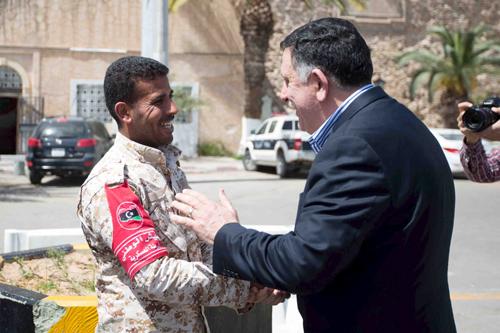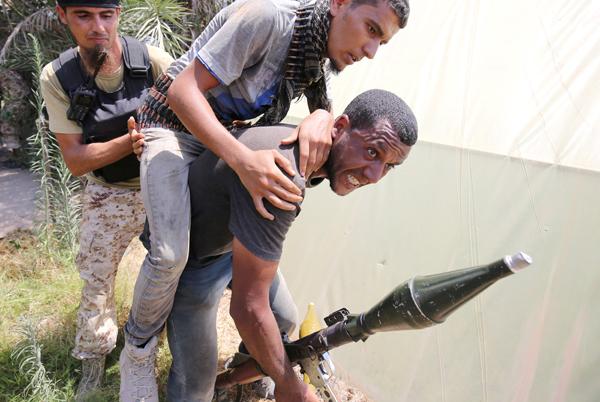You are here
Money, militant threat drive support for new Libya gov’t
By AFP - Apr 07,2016 - Last updated at Apr 07,2016
TRIPOLI — In seeking to establish its authority in the chaos of Libya, the UN-backed new unity government has two major trump cards — control of state funds and fears of rising extremist influence.
Prime Minister-designate Fayez Al Sarraj's Government of National Accord has so far managed to win broad support, experts and local sources say.
It faces major challenges, and suffered a setback on Wednesday when the head of a rival Tripoli-based authority, Khalifa Ghweil, contradicted an earlier announcement from his administration that it would stand down.
But by undercutting support for its rivals among Libya's armed groups and positioning itself as a bulwark against the Daesh terror group, the Sarraj government appears to be gaining ground.
After losing control of state coffers to the new administration, the Tripoli authority is unable to keep up payments to the armed groups that propelled it to power, a politician close to the unity government told AFP.
"Some members of armed groups are no longer being paid and others fear suffering the same fate," he added, speaking on condition of anonymity.
"These armed groups prefer supporting the unity government" for now, he said, warning that "the risk of violent clashes remains" if Sarraj's administration does not bring the militias fully on board.
Sarraj, who is operating under a UN-sponsored power-sharing deal agreed by some Libyan lawmakers in December, surprised observers with a sudden arrival in Tripoli under naval escort last week.
Winning militia support
He has since moved to restore some semblance of order to Libya, which collapsed into disarray after the 2011 ouster and killing of longtime dictator Muammar Qadhafi.
The country has been split between rival powers since a militia alliance seized control of Tripoli in mid-2014, forcing the government backed by the internationally recognised parliament to flee to the country's far east.
After setting up his headquarters at a naval base last week, Sarraj won the support of key players including the Central Bank and the National Oil Corporation, the backbones of Libya's economy.
Many were surprised by the lack of resistance following Sarraj's arrival, but a security source in Tripoli told AFP that the ground had been prepared for his arrival.
The unity government's security committee "met with the leaders of the armed groups for weeks before his arrival in Tripoli, calling for calm", the source said.
"There is no security body or armed group now opposed to the unity government, and they are holding back while the situation, and this government's actions, become clear," he said.
The unity government has also won the support of 10 cities that had been under the control of the Tripoli administration.
Experts said that endorsement was grounded in concerns that the Tripoli authority was failing to protect the country from the growing threat posed by Daesh.
The extremist group last year seized control of Qadhafi's coastal hometown of Sirte and has been fighting to expand to other areas.
Earlier this year Daesh fighters briefly seized the centre of Sabratha, about 70 kilometres west of Tripoli, after establishing a training camp on the outskirts of the city that was targeted in a US air strike in February.
'There can be no rush'
Sabratha was among the 10 cities that rallied behind the new government and the one that made the announcement of their support.
"The fear of IS [Daesh] was behind the rallying of several Libyan cities behind the unity government," said Marc Pierini, an analyst with Carnegie Europe and former EU envoy to Tripoli and Tunis.
"In Libya there is a fear of a Western intervention [against Daesh], which nobody wants," he said. "Any Libyan would prefer to avoid seeing foreign troops land."
Concerned by the growth of Daesh just across the Mediterranean from Europe, Western governments have mulled sending troops against the extremists in Libya, insisting however that they be invited by an internationally recognised unity government.
Western fears about Libya's chaos have been compounded by a rise in migrants making the sea journey from the North African nation to European shores. People smugglers have been exploiting Libya's chaos and around 330,000 migrants have landed in Italy from Libya since the start of 2014.
Still, analysts are warning that — despite some hopeful signs — Libya's descent will not be reversed overnight.
"There can be no rush in Tripoli," said Patrick Haimzadeh, a Libya expert and former French diplomat in Tripoli.
"In Libya it's about building a consensus.... People are rather pragmatic in Libya. There may be a virtuous circle built around political and economic compensation."
Related Articles
TRIPOLI — Libya's UN-backed unity government won the support Friday of guards who secure the country's key oil terminals, the latest pledge
TRIPOLI — Residents of Tripoli have started to breathe a little easier since the head of a new unity government came to town promising a way
TRIPOLI — Libyan forces said Tuesday they were advancing inside the extremist bastion of Sirte, as Washington conducted a second straight da













